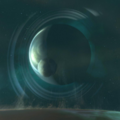Reach: Difference between revisions
From Halopedia, the Halo wiki
No edit summary |
(Vandled) |
||
| Line 20: | Line 20: | ||
|technology tier = Tier 3 | |technology tier = Tier 3 | ||
}} | }} | ||
{{quote|...our fortress among the stars. | {{quote|...our fortress among the stars.|[[Catherine Elizabeth Halsey|Dr. Catherine Halsey]]<ref>[[Halo: Reach ViDoc: A Spartan Will Rise]]</ref>}} | ||
'''Reach''' was a [[human]] colony world in the [[Epsilon Eridani System]], located within the [[Inner Colonies]]. At 10.5 light years from the [[Sol System]], it is located at [[Earth]]'s metaphorical doorstep. Reach is the fourth largest planet in the Epsilon Eridani system, and second closest to the star Epsilon Eridani.<ref name="bnet"/> | '''Reach''' was a [[human]] colony world in the [[Epsilon Eridani System]], located within the [[Inner Colonies]]. At 10.5 light years from the [[Sol System]], it is located at [[Earth]]'s metaphorical doorstep. Reach is the fourth largest planet in the Epsilon Eridani system, and second closest to the star Epsilon Eridani.<ref name="bnet"/> | ||
Revision as of 14:43, October 23, 2010
- "...our fortress among the stars."
- — Dr. Catherine Halsey[1]
Reach was a human colony world in the Epsilon Eridani System, located within the Inner Colonies. At 10.5 light years from the Sol System, it is located at Earth's metaphorical doorstep. Reach is the fourth largest planet in the Epsilon Eridani system, and second closest to the star Epsilon Eridani.[2]
Overview
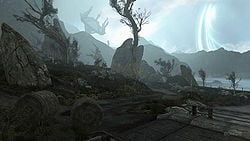
For a young planet with an age of no more than one billion years, compared to the 4.6 billion years of Earth, Reach is remarkably geologically stable.[2] Reach is larger than Earth, having a diameter of 15,273 kilometers, compared to the 12,756 kilometers diameter of Earth.[3] Reach was originally inhospitable for human life, requiring some degree of terraforming before it could be colonized. Mostly a rugged and harsh wilderness filled with towering mountains, deserts and weather-beaten forests, Reach's surface is pockmarked with meteor impact craters, some of these forming large seas.[4] It is also located near a small nebula, which has a visible effect on the planet and its moons, casting an "aura" similar to the Aurora Borealis, though this could be caused by a stronger magnetic field.
Many of the original settlers hailed from Eastern Europe, particularly Hungary, which is reflected in some of the place names on the planet. Many of the planet's inhabitants also spoke Hungarian as their first language. Despite Reach's harsh nature, some settlers chose to live in small communities of homesteads, referred to as "Kivas",[5] in the wilderness instead of the major cities. Rounded and enclosed, they were comfortable but practical, shuttered against Reach's forceful climate and bunkered into hillsides. It also related their independent nature; powered by wind turbines and hydroelectric plants, they were off the grid and self-sustaining.[6][7]
Reach was one of, if not the most important headquarters for the United Nations Space Command and the main supplier of military and civilian spacecraft, and the location of the UNSC's largest and most active shipyard. High Command, Fleet Command and the Marine Corps maintained headquarters on Reach, as well as many primary Naval Intelligence bases, which included the highly classified CASTLE Base. It was also where the UNSC's most elite troops, including the ODSTs as well as the SPARTAN-IIs, were trained. Reach's purpose was not solely military however; the surface of the planet also featured farmland and civilian towns and districts.[8] The largest cities on Reach were Manassas, Quezon and Ezhtergom. Reach had at least three space elevators, located near the city of New Alexandria.[9] Reach was also the largest non-automated exporter of titanium.[2]
Before the Covenant invasion, Epsilon Eridani's superior interstellar jump point had been the most active Slipstream Space transfer zone (arrivals and departures) for over thirty years, with the system's inferior IJP and Sol's superior IJP regularly trading second and third place spots.[2]
After the Fall of Reach, most of the planet's surface was glassed. When UNSC forces finally abandoned the planet, a small Covenant occupation fleet remained in the system.
History
The Forerunners
The Forerunners maintained a presence on Reach long before Human colonization. They built at least two complexes; one beneath Menachite Mountain, and another beneath the Babd Catha Ice Shelf. Both of these were later discovered by the UNSC.
UNSC powerhouse
First planetary confirmations of Reach were in early 21st century.[2] Originally colonized in the early 25th century[6] for its rich titanium deposits, Reach exported more of it than any other non-automated human world[2] and had mines throughout it running thousands of meters deep. ONI's secret CASTLE Base was located in one of these mines underneath Menachite Mountain. The Office of Naval Intelligence commandeered the mine after it breached a secret complex beneath Reach's surface containing a Forerunner artifact that was highly desired by the Covenant. The fact that this artifact was so valuable to them is perhaps the main reason anyone survived the aftermath of the Fall of Reach at all, as the Covenant were afraid of destroying it. This facility was also the birthplace of the legendary SPARTAN-II Program.
The SPARTAN-IIs were trained and housed on Reach. It was said by Fred-104 that Reach was their home, and every SPARTAN-II would fight to the death to defend her.[10] It was hinted that Reach was more important to the SPARTANs than Earth, the home world of humanity.
Despite its position as the UNSC's largest naval base, strategic headquarters, and second-largest population center, the Epsilon Eridani system was wracked by Insurrectionist activity throughout the early 26th Century. Reach's sister planet, Tribute, was one of the fronts for the UNSC's anti-terrorist campaign, Operation: TREBUCHET. In 2525, mere months prior to the outbreak of the Human-Covenant War, Reach was the site of a major terrorist bombing against the luxury liner National Holiday. Two taxi-shuttles filled with explosives were crashed into the liner, resulting in the liner to lose control and plummet into the atmosphere, incinerating everyone on board.
The Fall of Reach
- Main article: Fall of Reach
Reach's darkest hour was near the close of the Human-Covenant War in 2552. The Covenant discovered the location of Reach from a Forerunner artifact recovered during the Battle of Sigma Octanus IV. That artifact disclosed its locality, as Reach was the location of yet another artifact. Coincidentally, the Human presence on Reach was revealed when the destroyer Iroquois returned to Reach ensuing the battle, unaware that a Covenant spy drone was attached to her hull near the engines.[11]
The UNSC had formulated a plan to end the war. A platoon of SPARTAN-IIs would hijack a Covenant ship, head to their home planet, kidnap the Covenant leadership, and use them to broker a truce with the Covenant. The SPARTANs were aboard the UNSC Pillar of Autumn with Captain Keyes and his crew. They were just about to leave for their mission when a signal ordered their immediate recall to Reach to defend the planet against a massive Covenant attack. Master Chief Petty Officer John-117 ordered the majority of the SPARTANs to the planet's surface to protect the generators for the Orbital Defense Platforms while he and two other SPARTANs boarded Reach Station Gamma to secure an unprotected NAV database aboard the ONI corvette Circumference.
The battle was a disaster for the numerically-inferior UNSC fleet, despite the Super MAC Guns, resulting in the planet's destruction by means of plasma bombardment. CASTLE base was destroyed after the planet's fall and the Covenant began searching for a Forerunner crystal. UNSC forces finally abandoned the planet during the Raid of Reach, a few days later.
By 2589, Reach had been terraformed and restored to a habitable state, and new human colonists were re-settling the planet.[12]
Defenses
While Earth was rightly seen as the UNSC's commercial, political, and cultural center; Reach was undeniably the hub of its military power. The Epsilon Eridani Defense Fleet was a full strength Carrier Group with the Supercarrier UNSC Trafalgar at its core.[2]
Orbiting around Reach were a semi-mobile array of twenty Orbital Defense Platforms (ODP), equipped with heavy MAC Guns also known as "big sticks," some of which were in place as early as 2527. They were in turn defended by multiple wings of single ships and tactical multi-role craft. In addition, there were also about 100 to 150 warships stationed in the Epsilon Eridani System at any time. The ODPs were destroyed during the invasion of Reach, or were disabled by ground troops by destroying their power source. Despite their huge numbers, the fleet of warships was destroyed by an even larger Covenant fleet.
- Total Available Military Manpower: 385,421,100
- Total Land Assets: 58,430
- Total Naval Assets: 1,209 (T); 75 (X)
- Total Air Assets: 11,050
- Serviceable Airports: 1,246
- Defense Budget: cR. 38,287,000,000 [2548][2]
Locations
Ground locations |
StatesCitiesOrbital locations
|
Gallery
A comparison of Earth's size to Reach's.[3]
- Concept 04.jpg
Concept art showcasing the weather-beaten landscape on Reach.
Turul and Csodaszarvas, the two natural satellites of Reach.
- HaloReach - Flora.jpg
Flora on Reach.
The city of New Alexandria on Reach.
Daisy-023 in a city on Reach.
A hydroelectric plant on Reach.
A ship breaking yard on Reach.
Sword Base on Reach.
A hologram of Reach in a Covenant corvette's holotank.
- Viery.jpg
A satelite view of the Viery Territory note the UNSC order of battle for the Battle of Viery.
A destroyed UNSC frigate over Reach during the Fall.
- HaloReach - ColonyShip.png
A UNSC colony ship arrives to re-colonize Reach in 2589.
- 1222px-Fall of Reach (ET).jpg
Another view of Reach after its glassing (Note the destroyed station).
List of appearances
- Halo: Combat Evolved (Mentioned only)
- Halo 2
- Halo 3: ODST (Mentioned only)
- Halo: Reach
- Halo: The Fall of Reach (First appearance)
- Halo: First Strike
- Halo: Ghosts of Onyx (Mentioned only)
- Halo: Contact Harvest (Mentioned only)
- Halo: The Cole Protocol
- Halo: Evolutions - Essential Tales of the Halo Universe
- Pariah
- Dirt (Mentioned only)
- The Return (Mentioned only)
- Halo Wars: Genesis (Mentioned only)
- Halo Legends
Sources
- ^ Halo: Reach ViDoc: A Spartan Will Rise
- ^ a b c d e f g h Cite error: Invalid
<ref>tag; no text was provided for refs namedbnet - ^ a b Twitpic: Earth and Reach comparison
- ^ GameInformer: February Edition
- ^ Halo: Reach, Legendary Edition Developer Commentary
- ^ a b EDGE Magazine, February 2010
- ^ Halo: Reach level Powerhouse
- ^ Halo: Evolutions - Essential Tales of the Halo Universe, page 52
- ^ YouTube: E3 2010 Firefight 2.0 Beachhead Gameplay
- ^ Halo: First Strike, page ??
- ^ Halo: The Fall of Reach, page 216
- ^ Halo: Reach, campaign level Lone Wolf
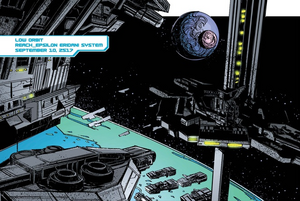
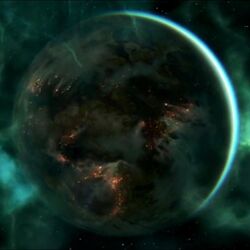
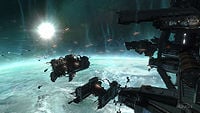
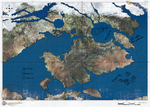
![A comparison of Earth's size to Reach's.[3]](https://halo.wiki.gallery/images/thumb/f/fa/Reachtoearth.jpg/150px-Reachtoearth.jpg)



